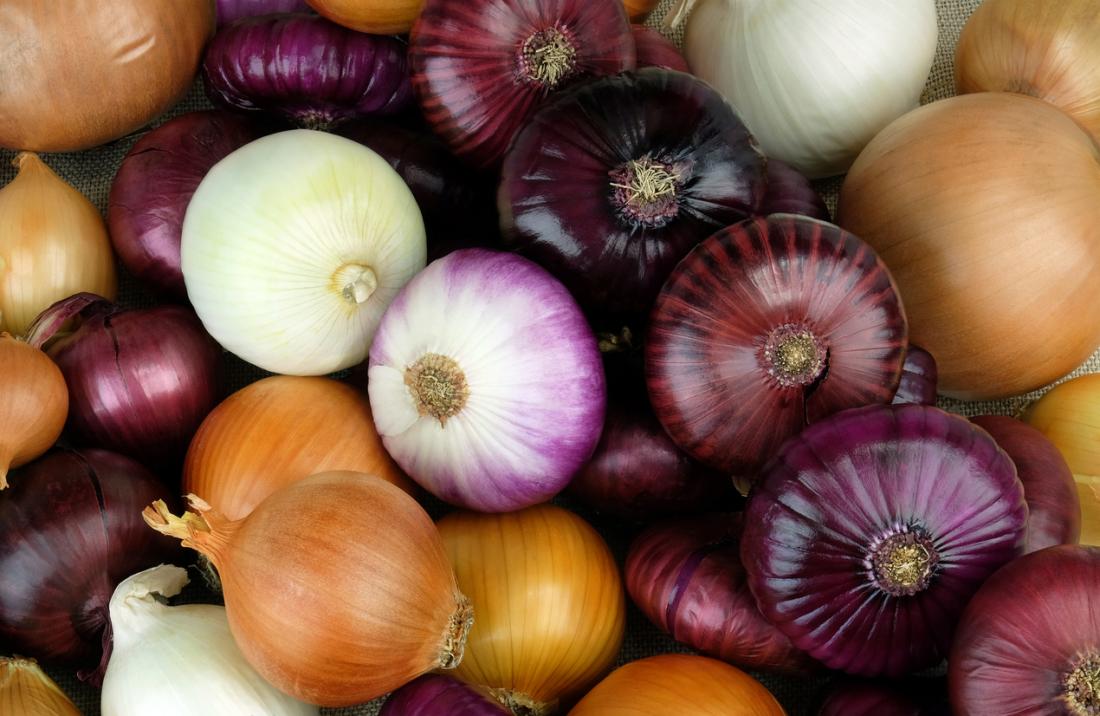
Almost every recipe starts with ‘peel and chop an onion’. Not for nothing, because a fried outing immediately gives your meal a little more flavor and spice. In addition, they are easy to have in stock, they are not expensive, you can eat them raw, baked, fried and fried, they can have the lead role (for example in onion soup or a caramelized onion quiche) but also do very well in a supporting role.
Topper
It will therefore come as no surprise that onions are in the top 10 of most eaten vegetables. We therefore eat more of it on average than other toppers such as cauliflower and tomato. The onion, along with leeks, chives and garlic, belongs to the onion family, to the genus allium.
Types of onions
The yellow onion is the best known of all onion types. The skin is brown to golden and the onion is white on the inside. The onion has a sharp taste, especially raw, but once baked, the sharpness is less. If you don’t like the sharpness, you can also opt for the sweet onion. This one resembles the yellow onion, but is a bit sweeter and less sharp. Because the onion layers are thicker, this onion is perfect for cutting into rings for a hamburger. The red onion has beautiful purple-red layers and immediately adds color to your salads. This onion is also slightly sweet and has a sharp taste. In terms of taste, the shallot most resembles the red onion. In fact, it is more related to the garlic than the onion; they grow together in several clusters, just like garlic. Spring onion, with its green stems and white underside, resembles leeks a bit more. When sold in bunches, we often refer to them as spring onions. Then there is also the white onion. You don’t come across this onion very often in the Netherlands. White onions are large and have a tart flavor.
Tearing eyes
Do you often suffer from watery eyes when you cut onions? This is because you destroy the cells in an onion and thus give substances in those cells the opportunity to react with oxygen. This creates the substance synpropaanthial-S-oxide. This is a gaseous substance that forms a sulfuric acid compound in contact with (eye) moisture. This compound irritates your eyes. The result: your eyes try to wash this away with tears. Not in the mood for tear eyes when cutting onions? Put them in the fridge for a few hours beforehand, keep them under water while cutting and use a sharp knife.
5 reasons to eat onions more often
1. Onions count towards your 250 grams of vegetables
Many people find it difficult to eat the recommended amount of vegetables of 250 grams per day every day. Understandable if you only eat those vegetables with your evening meal and choose 1 type. But onions can actually spice up your meal without feeling like ‘vegetables’: a chopped onion in the gravy or sauce, spring onions in a salad or chopped on a soup, a fried onion in the omelette for lunch …
2. Onions contain many vitamins and minerals
Onions contain many different nutrients. They contain vitamins B2, B6, B11, C and the minerals potassium, calcium, phosphorus, iron, magnesium, copper and zinc.
3. Onions contain quercetin
Research shows that people who eat plenty of onions have a lower risk of death from cardiovascular disease than people who do not eat onions. This is likely due to its high content of quercetin, an antioxidant also commonly found in tea, apples, grapes, broccoli, and red wine. Laboratory research at TNO2 has shown that quercetin reduces inflammation in blood vessels and therefore helps prevent arteriosclerosis.
4. Onions contain fiber
Fiber is important for the functioning of your intestines. They provide a breeding ground for beneficial bacteria that live in your gut (see reason 5) and they keep your stool supple. With a fiber-rich diet you have less chance of constipation. In addition, fibers give a full feeling, so that you do not feel like unhealthy snacks as quickly.
5. Onions contain inulin
Onions contain a lot of the dietary fiber inulin. It is a form of ‘prebiotics’: food for intestinal bacteria. Especially ‘good’ bacteria feast on it and it pushes back the pathogenic bacteria Clostridium perfringens. It is a fiber that our intestines cannot break down because we lack the necessary enzyme, but our bacteria can. If you feed the good bacteria in your intestines, you support your resistance. Inulin also stimulates the absorption of calcium in the intestines – which in turn ensures healthier bones.











